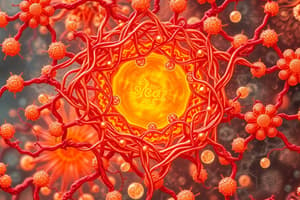Podcast
Questions and Answers
What is one of the primary roles of the extracellular matrix?
What is one of the primary roles of the extracellular matrix?
- Stimulating cellular proliferation
- Regulating gene expression in cells
- Providing mechanical support (correct)
- Installing cellular membranes
Which statement best describes the interaction between cells and the extracellular matrix?
Which statement best describes the interaction between cells and the extracellular matrix?
- Cells produce matrix components but do not respond to them.
- Cells are passive structures affected solely by external stimuli.
- The interaction forms a continuum allowing functional responses to stimuli. (correct)
- The extracellular matrix entirely dictates cell behavior without feedback.
What is essential for studying tissues under a light microscope?
What is essential for studying tissues under a light microscope?
- Use of colored dyes exclusively
- Thick tissue slices for better resolution
- Translucent thin slices of tissues (correct)
- Live cell observations only
What is the purpose of fixation in tissue preparation?
What is the purpose of fixation in tissue preparation?
Which type of tissues does the central nervous system primarily consist of?
Which type of tissues does the central nervous system primarily consist of?
What is a common challenge in the preparation of histological sections?
What is a common challenge in the preparation of histological sections?
What contributes to the identification of different tissue subtypes?
What contributes to the identification of different tissue subtypes?
Which method is used to create thin tissue sections for microscopic examination?
Which method is used to create thin tissue sections for microscopic examination?
Flashcards
Extracellular Matrix
Extracellular Matrix
The complex network of molecules outside cells that provides structural support, nutrient transport, and waste removal.
Collagen
Collagen
The primary building block of the extracellular matrix, forming strong fibrils that provide tensile strength.
Basement Membrane
Basement Membrane
A specialized type of extracellular matrix that acts as a barrier between tissues, providing support and controlling the passage of molecules.
Cell-matrix interaction
Cell-matrix interaction
Signup and view all the flashcards
Cell surface receptors
Cell surface receptors
Signup and view all the flashcards
Histology
Histology
Signup and view all the flashcards
Histological sections
Histological sections
Signup and view all the flashcards
Tissue Fixation
Tissue Fixation
Signup and view all the flashcards
Study Notes
Extracellular Matrix (ECM)
- ECM composed of molecules like collagen fibrils and basement membranes, forming complex structures.
- Primary functions: mechanical support, nutrient transport, waste removal.
- Cells interact dynamically with the ECM, influencing and creating ECM components.
- ECM molecules connect to cell surface receptors, which often interact with cytoplasmic molecules.
- This cell-ECM interaction facilitates coordinated function and response to stimuli.
Tissue Structure and Organization
- Fundamental tissues combine specific cell types with associated ECM, helping distinguish tissue subtypes.
- Most organs are made from multiple tissue types combined, exept the CNS which is primarily nervous tissue.
- Diverse tissue combinations crucial for organ and organism function.
Histology and Tissue Preparation
- Histology studies tissue biology using microscopes due to the small size of components.
- Tissue sections required for light microscopy examination, needing thin, translucent slices.
- Direct microscopic observation of living cells/tissues sometimes possible without sectioning.
- Tissue preparation involves slicing into thin sections, mounting on slides, and using microtomes.
- Ideal preparation preserves original structure and composition, but artifacts can occur.
- Fixation, using chemical or physical methods, crucial for preventing tissue autolysis and preserving structure in permanent sections.
Studying That Suits You
Use AI to generate personalized quizzes and flashcards to suit your learning preferences.
Description
Explore the role of the extracellular matrix (ECM) in tissue structure and organization. Understand how ECM molecules support cell interactions and influence tissue types. This quiz covers fundamental histological concepts and the preparation of tissue samples for microscopic examination.




